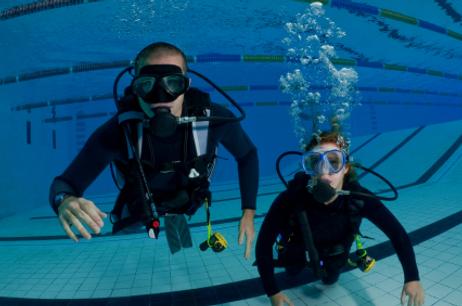Are you interested in a new hobby that will open the sea's mysteries? Are you hoping to enrich your college experience with a unique and entertaining course? Whether you're interested in learning to scuba dive for recreational or educational reasons, community colleges across the country are qualified to provide students with the necessary skills, training, and practice to become certified divers. These courses are generally open to registered students and adult community members pursuing continuing education.
Indeed, scuba diving courses can be a fun and engaging opportunity to explore new underwater worlds!
How to Get Certified to Scuba Dive
Scuba divers must obtain a certification card to prove they completed a reputable training course. The most common certification agencies are PADI, NAUI, YMCA, SSI, and other local institutions. Often, community college campuses provide certification courses through one of these leading agencies.
The most common certification venue when enrolling in a scuba training class is an “open w" or” scuba" class. Once you complete this primary scuba course, you must pass all the tests and required dives before receiving official certification. Upon earning a certification card, a scuba diver never needs to re-enroll for training, but once this step is completed, you can maintain your certification status for life!
Most scuba courses require that all participants be in healthy physical shape. Participants should be able to swim at least 200 yards and float or tread water for at least 10 minutes without stopping. In addition to these standards, a scuba course will guide students through the major concepts and elements of scuba diving, including mandatory bookwork, exams, pool training, and open-water diving sessions. The duration of a certification course may fluctuate depending on the training facility.
Community College Scuba Certification
While many community colleges sponsor scuba clubs, many campuses have integrated scuba diving into their physical and science education curriculum options.
For example, Broward Community College, located in Fort Lauderdale, Florida, offers a comprehensive scuba diving training and instruction course through its physical education department. By enrolling in the BCC certification class, students will be exposed to the fundamental skills of scuba diving and snorkeling and learn theories and safe scuba practices. While some schools allow students to practice their newly acquired skills in a chlorinated pool, BCC students can take advantage of a more realistic scuba experience by participating in open water dives at the campus’ nearby Tigertail Lakecampus'BCC’s open water scuba courseBCC'se Community College, located in Eugene, Oregon, also allows students and adult learners to obtain certification and training through an open water course. In examining the details of LCC’s scuba training class, I found that a student’s PRLCC is based on standards of student science and is focused on the core content areas of scuba diving. As such, students’ grades are determined based on sstudents'lass percentages:
- 20% of the course grade is based on Affective Domain (students’ sportsmanship, responsibility, astudents'ness)
- 40% of the course grade is based on “Watermanship” (this category includes act"vities known" as “pool labs,” wherein students practice the"r learned "kills and techniques)
- 20% of the course grade is based on quizzes
- 20% of the course grade is based on the final scuba diving exam
Taking Scuba Diving Classes One Level Deeper
Building on the foundational certification courses provided by schools such as BCC and LCC, individuals can also enroll in more advanced options geared towards experienced divers.
For example, Des Moines area students who have already earned their scuba certification can opt to enroll in the Diving Biology course, available at Highline Community College in Iowa. In HCC’s field-based diving class, experts in HCC'stors teach students about the identification and natural history of marine life, specifically marine invertebrates. With a series of lectures and dives in Puget Sound, students can expand their diving skills and knowledge through the guidance of trained and experienced experts.
Community colleges are excellent places to learn about scuba diving and earn your certification. So what are you waiting for? Dive right in!
Questions? Contact us on Facebook @communitycollegereview.















